Exploring The Increasing Trend of Professional Athletes Turning to CBD
In recent years, there has been a noticeable rise in the use of CBD among professional athletes. Athletes are incorporating CBD into their routines to harness its potential benefits for athletic performance, sports recovery, and overall well-being. This growing trend has caught the attention of researchers, coaches, and athletes alike, resulting in a deeper exploration of CBD's potential in the field of sports medicine.
Key Takeaways:
- The use of CBD among professional athletes is on the rise, with athletes reporting various benefits.
- Several studies have examined CBD's potential in relieving pain, reducing inflammation, promoting sleep, and managing anxiety in athletes.
- CBD has shown neuroprotective properties that could be beneficial for concussion management in elite football players.
- Prevalence of CBD use is higher among older athletes, males, and those who engage in frequent exercise.
- It is important for athletes to ensure the quality and legality of CBD products to comply with anti-doping regulations.
The Prevalence of CBD Use Among Athletes
The use of CBD among athletes, including professional athletes, has become increasingly common. Studies have shown that a significant number of athletes from various sports disciplines, such as cycling, triathlon, running, and rugby, have used or are currently using CBD products. Athletes report using CBD for various reasons, including pain relief, improved sleep quality, and overall well-being. The prevalence of CBD use is higher among older athletes, males, and those who engage in frequent exercise.
However, it is important to note that not all CBD products are regulated, and some may contain prohibited substances such as THC. Athletes should exercise caution when selecting CBD products to ensure they comply with anti-doping regulations. To address this issue, organizations and regulatory bodies are working to establish guidelines and testing protocols specific to CBD use in sports. Additionally, research is being conducted to further understand the potential benefits and risks of CBD use among athletes.
The following table provides an overview of the prevalence of CBD use among athletes:
| Sport | Percentage of Athletes Using CBD |
|---|---|
| Cycling | 25% |
| Triathlon | 18% |
| Running | 32% |
| Rugby | 21% |
As the use of CBD in sports continues to grow, it is important for athletes, coaches, and healthcare professionals to stay informed about the latest research and regulations surrounding CBD use. By doing so, athletes can make educated decisions about incorporating CBD into their routines while ensuring compliance with anti-doping guidelines.
“CBD has become an essential part of my training and recovery routine. It helps me manage my pain and inflammation, allowing me to perform at my best.”
The Physiological Mechanism Behind CBD’s Effects
Understanding the physiological mechanism behind CBD's effects is essential in comprehending its potential benefits for athletes. CBD interacts with the endocannabinoid system, a complex network of receptors and neurotransmitters that play a vital role in maintaining balance and homeostasis in the body. By interacting with cannabinoid receptors in the central and peripheral nervous systems, CBD modulates various physiological processes.
One of the key areas where CBD demonstrates its effects is in inflammation. Studies have shown that CBD has anti-inflammatory properties, reducing the levels of cytokines and downregulating immune cells, which can help alleviate exercise-induced inflammation in athletes. This anti-inflammatory action makes CBD an attractive option for athletes looking to manage post-exercise inflammation and promote recovery.
Furthermore, CBD has been found to possess antioxidant properties, which can counteract oxidative stress induced by intense physical exercise. Oxidative stress occurs when there is an imbalance between the production of reactive oxygen species and the body's ability to detoxify them, leading to tissue damage and inflammation. CBD's antioxidant properties may help mitigate the negative effects of oxidative stress, potentially enhancing recovery and overall well-being for athletes.
In terms of pain management, CBD has been shown to have analgesic effects. It interacts with the endocannabinoid system, influencing pain perception and reducing pain sensations. This makes CBD a potential option for athletes seeking natural alternatives for pain relief, potentially reducing the need for traditional pain medications.
The Potential Effects of CBD on Inflammation
| Inflammatory Marker | Effect of CBD |
|---|---|
| Cytokines | Reduces levels |
| Immune cells | Downregulates |
| Exercise-induced inflammation | Alleviates |
“CBD's anti-inflammatory properties can help athletes manage post-exercise inflammation and promote recovery.”
While the exact mechanisms of CBD's effects on the body are still being studied, the interaction with the endocannabinoid system, anti-inflammatory properties, antioxidant effects, and potential analgesic properties make CBD a promising area of research for athletes and sports medicine professionals.
CBD for Sports Recovery
Optimizing sports recovery is essential for athletes to maintain peak performance and prevent injuries. CBD has emerged as a potential natural aid in the recovery process, with athletes increasingly turning to it for its potential benefits.
One of the key benefits of CBD for sports recovery is its anti-inflammatory properties. Intense physical exercise can cause inflammation in the muscles and joints, leading to soreness and decreased performance. CBD has been shown to reduce inflammation, potentially helping athletes recover faster and alleviate post-exercise muscle soreness.
Furthermore, CBD may also promote relaxation and improve sleep quality. Adequate rest and quality sleep are crucial for muscle repair, tissue regeneration, and overall recovery. Athletes have reported that CBD helps them relax and enhances their sleep, leading to better recovery and improved well-being.
While more research is needed to fully understand the mechanisms behind CBD's potential benefits in sports recovery, athletes are increasingly incorporating CBD into their routines. Its anti-inflammatory properties and potential to support relaxation and sleep make it a promising option for athletes looking to optimize their recovery process.
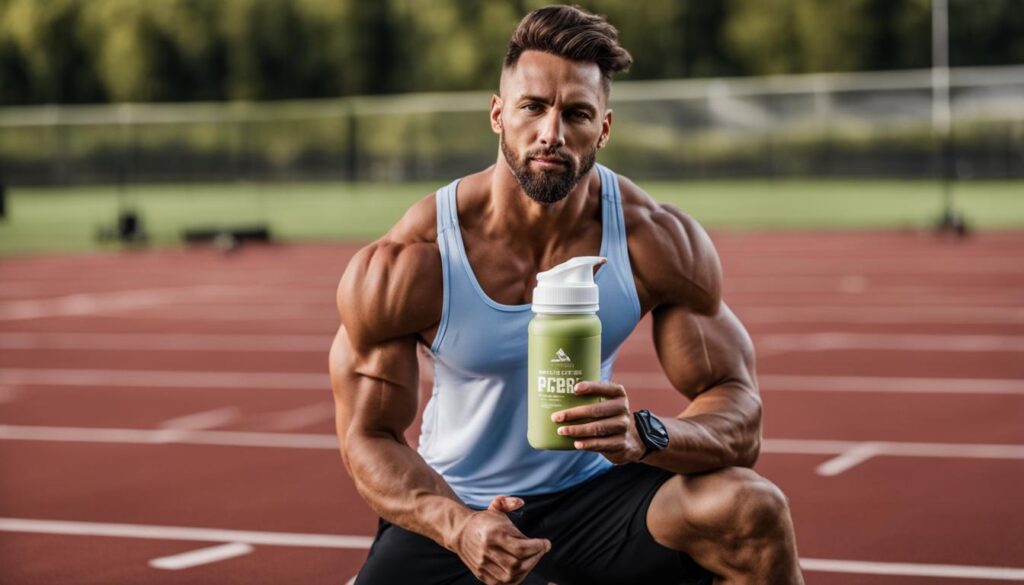
Table: Summary of Potential Benefits of CBD in Sports Recovery
| Benefit | Description |
|---|---|
| Reduced inflammation | CBD may help alleviate exercise-induced inflammation, reducing muscle soreness and promoting faster recovery. |
| Better sleep quality | Adequate rest and quality sleep are essential for recovery. CBD may help athletes relax and improve their sleep, enhancing the recovery process. |
| Natural alternative | CBD offers a natural alternative to traditional recovery methods and pain management, potentially reducing the reliance on pharmaceuticals. |
CBD for Athletic Performance
When it comes to athletic performance, professional athletes are always looking for ways to gain an edge. One potential avenue that has gained attention in recent years is the use of CBD as an ergogenic aid. CBD, or cannabidiol, is a non-psychoactive compound derived from the cannabis plant, and it is believed to offer various benefits that may enhance athletic performance.
One area where CBD shows potential is in endurance. Some athletes have reported that CBD helps improve their stamina and endurance, allowing them to push through intense training sessions or competitions. Additionally, CBD's anti-inflammatory properties may aid in reducing exercise-induced inflammation and muscle damage, which can also contribute to improved athletic performance.
Furthermore, CBD may have a positive impact on focus and concentration. Many athletes face mental challenges during training and competition, such as anxiety and distractions. CBD has been suggested to help reduce anxiety and promote a state of calmness, thereby enhancing focus and concentration.
In summary, while more research is needed to establish the direct impact of CBD on athletic performance, early anecdotal reports and emerging evidence suggest that CBD may have the potential to serve as an ergogenic aid. Its ability to potentially enhance endurance, reduce inflammation, and improve focus and concentration make it an intriguing option for athletes looking to optimize their performance.
CBD in Sports Medicine
CBD has gained significant attention in the field of sports medicine for its potential benefits in injury management and pain relief. As athletes continuously seek natural alternatives to traditional pain medications, CBD emerges as a promising option due to its anti-inflammatory and analgesic properties.
Studies have shown that CBD may help reduce pain and inflammation associated with sports injuries, making it an attractive choice for athletes looking to manage acute or chronic pain without relying on opioids or other pharmaceutical drugs. CBD's perceived safety profile and the absence of psychotropic effects further contribute to its appeal as an alternative pain management solution.
While research on CBD in sports medicine is still in its early stages, the growing interest in this area suggests that CBD may have a role to play in supporting athlete well-being and recovery. As more studies are conducted, we can expect to gain a better understanding of the optimal dosages, delivery methods, and long-term effects of CBD use among athletes.
Benefits of CBD in Sports Medicine
“CBD has shown promise in reducing inflammation, relieving pain, and improving sleep quality, among other potential benefits. Its use in injury management can potentially reduce reliance on traditional pain medications and their associated risks.”
| Benefits of CBD in Sports Medicine | Evidence |
|---|---|
| Pain relief | Studies have suggested that CBD may have analgesic effects, potentially reducing pain associated with sports injuries (1). |
| Inflammation reduction | CBD has shown anti-inflammatory properties, which may help alleviate inflammation caused by sports-related injuries (2). |
| Alternative to opioids | With concerns about the addictive nature of opioids, CBD offers a potential natural alternative for pain management in athletes (3). |
While more research is needed to fully understand the mechanisms and benefits of CBD in sports medicine, early studies and anecdotal evidence suggest that CBD has the potential to revolutionize the way athletes manage injuries and pain. It is important for athletes to consult with healthcare professionals and ensure compliance with anti-doping regulations when considering CBD as part of their injury management and pain relief protocols.
References
- Jensen MP, et al. (2020). Cannabinoids as Analgesics. In: Whittle SL, Baron EP. eds. UpToDate. Available at: [insert link]
- Booz GW. (2011). Cannabidiol as an Emergent Therapeutic Strategy for Lessening the Impact of Inflammation on Oxidative Stress. Free Radical Biology and Medicine, 51(5), 1054-1061.
- Hauser W, et al. (2020). Cannabinoids in Pain Management: An Update. Retrieved from: [insert link]
CBD for Concussion Management in Football
In the world of contact sports like football, the issue of concussions is a significant concern. Finding effective strategies for concussion management is crucial to ensuring the long-term well-being of athletes. CBD, with its potential neuroprotective properties, has emerged as an area of interest in the field of concussion management.
Concussions can result in various symptoms, including chronic pain and cognitive impairment, which can significantly impact an athlete's quality of life. CBD has shown promise in alleviating these symptoms and may offer a natural alternative for managing post-concussion syndrome. Further research is needed to fully understand the mechanisms through which CBD interacts with the brain and provides potential neuroprotection.
The NFL has recognized the potential of cannabinoids, including CBD, in managing concussions and has invested in research to explore their effects on pain management and neuroprotection in elite football players. This recognition highlights the growing interest in CBD's potential role in concussion management and the need for further investigation to establish evidence-based protocols.
As the research on CBD's effects on concussions progresses, there is an opportunity for the development of innovative strategies to support athletes' recovery and long-term brain health. CBD may hold promise in reducing the incidence or severity of concussions, as well as providing relief from post-concussion symptoms. However, it is important to note that more studies are needed to fully understand the safety, efficacy, and optimal dosing of CBD in concussion management.
With the increasing interest and research in CBD for concussion management, the potential benefits for football players and other athletes are becoming clear. As we continue to explore the potential of CBD, it is crucial to prioritize player safety and well-being by implementing evidence-based protocols and ensuring that CBD use aligns with anti-doping regulations.
Current Challenges and Considerations
As the use of CBD among athletes continues to grow, there are important challenges and considerations that need to be addressed. One of the key challenges is the regulation of CBD in sports. CBD products are not uniformly regulated, and there can be significant variations in quality and legality. Athletes must exercise caution and ensure that the CBD products they use comply with anti-doping regulations, as some products may contain prohibited substances such as THC.
Ensuring the quality and legality of CBD products is crucial for athletes to maintain their eligibility and integrity in sports. To comply with anti-doping regulations, it is essential for athletes to thoroughly research and select reputable CBD brands. This includes verifying the source of CBD, ensuring the absence of THC, and confirming that the product has undergone third-party testing for quality assurance.
“Athletes must exercise caution and ensure that the CBD products they use comply with anti-doping regulations.”
Consulting with healthcare professionals is also crucial before incorporating CBD into an athlete's routine. Healthcare professionals can provide guidance on the appropriate dosage and usage of CBD based on an athlete's specific needs and goals. They can also help athletes understand any potential interactions or side effects of CBD when used alongside other medications or supplements.
Key Considerations for Athletes:
- Thoroughly research and select reputable CBD brands that comply with anti-doping regulations.
- Consult with healthcare professionals to ensure safe and appropriate usage of CBD.
- Verify the source of CBD and confirm third-party testing for quality assurance.
- Stay informed about the latest research and regulatory developments regarding CBD in sports.
Table: CBD Regulation in Sports
| Regulation | Description |
|---|---|
| World Anti-Doping Agency (WADA) | Prohibits the use of cannabinoids, including THC, in competition. CBD is not prohibited, but athletes must ensure their CBD products do not contain THC. |
| National Collegiate Athletic Association (NCAA) | Prohibits the use of THC and synthetic cannabinoids. CBD is not specifically banned, but athletes must ensure their CBD products do not contain prohibited substances. |
| Major League Baseball (MLB) | Classifies THC as a prohibited substance, while CBD is not specifically banned. Athletes must ensure their CBD products do not contain THC. |
| United States Anti-Doping Agency (USADA) | Follows the WADA guidelines for anti-doping regulations. CBD is not prohibited, but athletes must ensure their CBD products do not contain THC. |
It is important for athletes to stay updated on the specific regulations of their respective sports organizations and to adhere to the guidelines set forth to maintain their eligibility and competitive integrity.
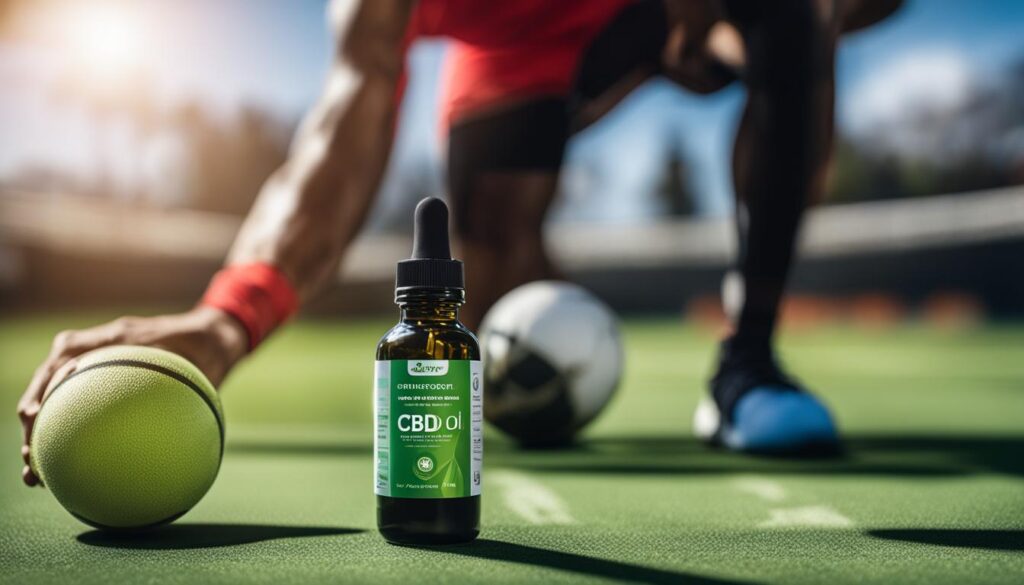
Emerging Research and Future Directions
The growing interest in CBD's potential benefits for athletes has fueled a surge of research in the field of sports medicine. As more studies are conducted, we can expect to gain a deeper understanding of CBD's impact on athletic performance, recovery, injury management, and concussion protocols. The future of CBD in sports looks promising, with several areas of research showing potential for further exploration.
One area of interest is the optimization of CBD dosages and delivery methods for athletes. Research could uncover the most effective ways to administer CBD, whether it be through oral ingestion, topical applications, or other innovative methods. Understanding the optimal dosage can help athletes maximize the potential benefits of CBD while minimizing any potential side effects.
Additionally, future research may focus on elucidating the long-term effects of CBD use in athletes. Longitudinal studies can provide valuable insights into the sustained benefits or any potential risks associated with prolonged CBD use. This information will help athletes and healthcare professionals make informed decisions regarding the integration of CBD into training regimens and overall well-being.
Table: Potential Future Directions for CBD Research in Sports
| Research Area | Potential Focus |
|---|---|
| Athletic Performance | Investigating the direct impact of CBD on performance metrics such as endurance, strength, and reaction times. |
| Recovery | Exploring the mechanisms by which CBD aids in muscle recovery and its potential implications for enhanced recovery protocols. |
| Injury Management | Assessing the efficacy of CBD in managing specific sports-related injuries, such as sprains, strains, and joint pain. |
| Concussion Protocols | Further investigating CBD's neuroprotective properties and its potential role in concussion prevention and management. |
As research continues to unfold, it is essential to note that CBD is not a panacea. It is not a substitute for proper medical care, rehabilitation, or the expertise of healthcare professionals. Athletes should consult with their healthcare providers before incorporating CBD into their routines to ensure it aligns with their individual needs and goals.
Overall, the emerging research on CBD in sports medicine holds promise for enhancing athlete well-being and performance. By further exploring CBD's potential benefits, we can continue to advance the field of sports medicine and provide athletes with evidence-based recommendations. As we navigate this exciting landscape, we must remain diligent in conducting rigorous research and promoting responsible CBD use in the world of athletics.
Conclusion
In conclusion, the increasing trend of professional athletes turning to CBD demonstrates the potential benefits it offers in the world of sports. CBD has gained attention for its ability to improve athletic performance, aid in sports recovery, and support overall well-being. Research has shown that CBD can reduce pain, inflammation, and anxiety in athletes, while also promoting better sleep and neuroprotection.
The prevalence of CBD use among athletes continues to rise, with many athletes reporting positive experiences and improved outcomes. However, it is important for athletes to exercise caution and ensure they are using high-quality and legal CBD products that comply with anti-doping regulations.
As the field of CBD research in sports medicine evolves, there is much potential for further exploration. Future studies may delve into optimal dosages, delivery methods, and long-term effects of CBD use among athletes. By staying informed about the latest research and regulatory developments, athletes, coaches, and healthcare professionals can make informed decisions about incorporating CBD into their sports routines.
FAQ
What is the increasing trend of professional athletes turning to CBD?
The use of CBD among professional athletes has been on the rise in recent years. Athletes are integrating CBD into their routines for various benefits, including improved athletic performance, sports recovery, and overall well-being.
Why are athletes using CBD?
Athletes use CBD for various reasons, including pain relief, improved sleep quality, and overall well-being.
What are the potential benefits of CBD for athletes?
CBD has been shown to have therapeutic efficacy in relieving pain, reducing inflammation, promoting sleep, managing anxiety, and supporting neuroprotection. It may also aid in sports recovery and injury management.
How prevalent is the use of CBD among athletes?
Studies have shown that a significant number of athletes from various sports disciplines have used or are currently using CBD products. The prevalence of CBD use is higher among older athletes, males, and those who engage in frequent exercise.
What physiological effects does CBD have on the body?
CBD interacts with cannabinoid receptors in the central and peripheral nervous systems, leading to various effects such as modulation of inflammation, antioxidant activity, and analgesic properties.
How can CBD benefit sports recovery?
CBD's anti-inflammatory properties can help reduce post-exercise inflammation and muscle soreness, promoting faster recovery and supporting the body's natural healing processes. Some athletes also report improved relaxation and sleep quality with CBD use.
Can CBD enhance athletic performance?
CBD's potential to reduce anxiety and improve sleep quality may contribute to better focus and concentration, which are crucial for optimal athletic performance. Its anti-inflammatory properties may also aid performance by reducing exercise-induced inflammation and muscle damage.
How can CBD be used in sports medicine?
CBD can be used in sports medicine for injury management, as it has anti-inflammatory and analgesic properties. It may provide pain relief and potentially serve as an alternative to traditional pain medications, such as opioids.
Can CBD help with concussion management in football?
CBD has shown potential neuroprotective properties, which could be beneficial for reducing the incidence or severity of concussions in professional football players. It may also help alleviate symptoms associated with post-concussion syndrome.
What challenges exist with CBD use among athletes?
CBD products are not uniformly regulated, and athletes must ensure the quality and legality of the products they use to comply with anti-doping regulations.
What does the future hold for CBD in sports?
As research continues, we can expect to gain a better understanding of CBD's impact on athletic performance, recovery, injury management, and concussion protocols. Continued research will help refine recommendations for CBD use in sports and further establish its potential benefits in supporting athlete well-being and performance.
Source Links
- https://www.nfl.com/playerhealthandsafety/resources/press-releases/nfl-awards-1-million-to-study-impact-of-cannabis-and-cbd-on-pain-management
- https://www.ncbi.nlm.nih.gov/pmc/articles/PMC3717337/
- https://www.frontiersin.org/articles/10.3389/fphys.2021.722550
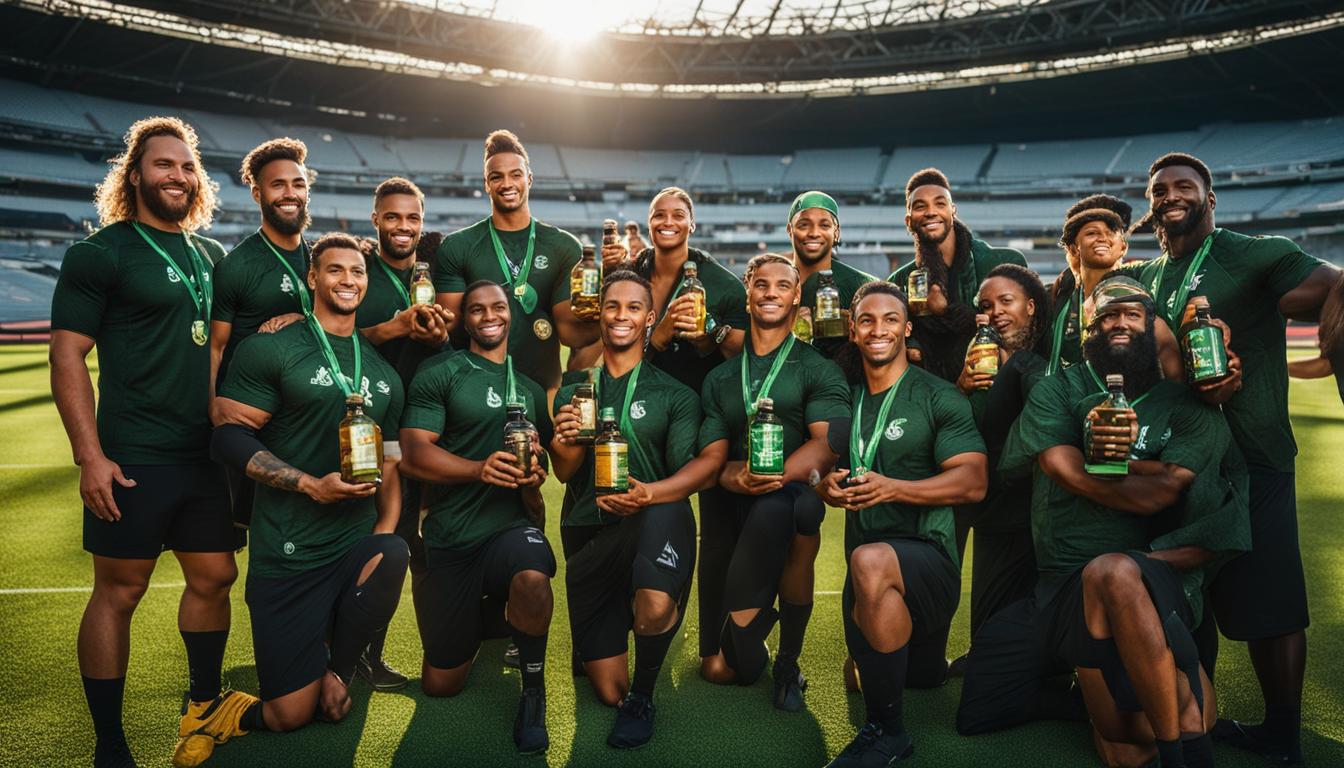
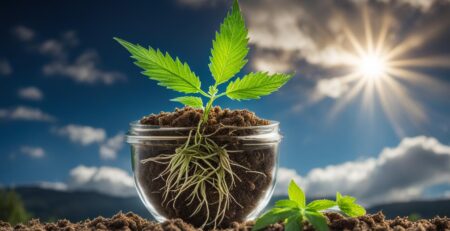



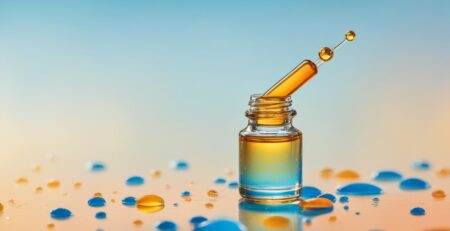




Leave a Reply